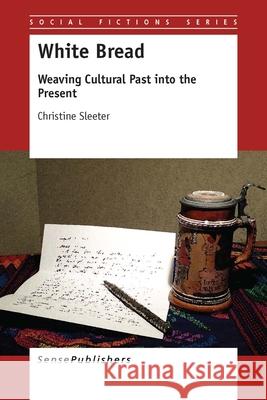White Bread : Weaving Cultural Past into the Present » książka
White Bread : Weaving Cultural Past into the Present
ISBN-13: 9789463000666 / Angielski / Twarda / 2015 / 300 str.
White Bread : Weaving Cultural Past into the Present
ISBN-13: 9789463000666 / Angielski / Twarda / 2015 / 300 str.
(netto: 399,71 VAT: 5%)
Najniższa cena z 30 dni: 419,70
ok. 22 dni roboczych.
Darmowa dostawa!
In White Bread, readers accompany Jessica on a journey into her family's past, into herself, and into the bicultural community she teaches but does not understand. Jessica, a fictional White fifth-grade teacher, is prompted to explore her family history by the unexpected discovery of a hundred-year-old letter. Simultaneously, she begins to grapple with culture and racism, principally through discussions with a Mexican American teacher. White Bread pulls readers into a tumultuous six months of Jessica's life as she confronts many issues that turn out to be interrelated, such as why she knows so little about her family's past, why she craves community as she feels increasingly isolated, why the Latino teachers want the curriculum to be more Latino, and whether she can become the kind of teacher who sparks student learning. The storyline alternates between past and present, acquainting readers with German American communities in the Midwest during the late 1800s and early 1900s, portraits based on detailed historic excavation. What happened to these communities gives Jessica the key to unlock answers to questions that plague her. White Bread can be read simply for pleasure. It can also be used in teacher education, ethnic studies, and sociology courses. Beginning teachers may see their own struggles reflected in Jessica's classroom. People of European descent might see themselves within, rather than outside, multicultural studies. White Bread can also be used in conjunction with family history research.
In White Bread, readers accompany Jessica on a journey into her familys past, into herself, and into the bicultural community she teaches but does not understand. Jessica, a fictional White fifth-grade teacher, is prompted to explore her family history by the unexpected discovery of a hundred-year-old letter. Simultaneously, she begins to grapple with culture and racism, principally through discussions with a Mexican American teacher. White Bread pulls readers into a tumultuous six months of Jessicas life as she confronts many issues that turn out to be interrelated, such as why she knows so little about her familys past, why she craves community as she feels increasingly isolated, why the Latino teachers want the curriculum to be more Latino, and whether she can become the kind of teacher who sparks student learning. The storyline alternates between past and present, acquainting readers with German American communities in the Midwest during the late 1800s and early 1900s, portraits based on detailed historic excavation. What happened to these communities gives Jessica the key to unlock answers to questions that plague her. White Bread can be read simply for pleasure. It can also be used in teacher education, ethnic studies, and sociology courses. Beginning teachers may see their own struggles reflected in Jessicas classroom. People of European descent might see themselves within, rather than outside, multicultural studies. White Bread can also be used in conjunction with family history research.











